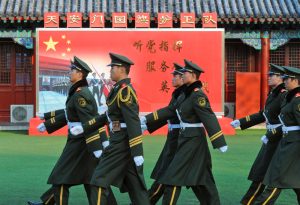The “One Belt, One Road” (OBOR) concept has remained frustratingly vague since it appeared in late 2013. One of the few things that can be said about it with any confidence is that it outlines the possibilities of a common economic zone among the 65 or so diverse member states. The heart of OBOR is an invitation for all the countries included to focus on benefits to be gained from engaging more with the Chinese economy. In that sense, it has proved to be a subtle, but very evident, gambit by China for a large number of countries linked to it by geography or logistics to factor Beijing more into their external thinking. A ploy for primacy perhaps, but initially in the economic, not the geopolitical, realm.
Despite this emphasis on economic links, there are inevitable questions about the ways in which the creation of a highly diverse, loose and abstract international common market centered on China bleeds into the area of security. The central, southeast and northeast Asian neighbors of China have significant security issues, many of them linked to their economic ones. Would a framework like OBOR ever allow these states to talk in a more shared way about these security issues, and involve China in their discussions? After all, economic success is of little lasting value without some kind of sense of sustainable security. The two are inextricable.
For this sort of dialogue to happen in the OBOR, there would need to be a far greater shared understanding of what security involves and what its key definition is. The simple fact at the moment is that China has a very specific understanding of security, of what drives it and what it aims to achieve, one that many of the OBOR partners would probably not share. In essence, the Beijing leadership views security as being about ensuring the stability of the Communist Party and its hold on power. It is about ensuring, by whatever means, that this is preserved; because otherwise, they believe, the unity and prosperous development of the nation come under threat.
The integral link between one party with a monopoly on power and security frames the way that China understands domestic threats, and how it prioritizes its actions against, for instance, Xinjiang activists and separatist groups. These forces are primarily a threat against the Party state. In the majority of OBOR nations, security dealing with threats against the state would be understood. Party security is a lesser concern.
Despite this difference, could the OBOR ever lead to a better quality discussion between China and the outside world on security issues? This is an important question, especially now in view of the truculence China is accused of showing in the South and East China Seas. Having at least one area with space to create a more shared concept of security would be useful. And using economic interests as a lead in would provide the least contentious path. At the moment, however, despite the threats that many OBOR partner nations face themselves, there seems little sign of deep mutual dialogue and cooperation. The trust with China is just not there in this area.
The recent tragic and brutal terrorist attacks in Paris might start to change this. China, many members of the OBOR (most importantly Russia), Europe, and the United States face a common enemy in the so-called Islamic State. China has remained very wary of getting sucked into the endless complexities of Middle Eastern politics and conflict. But the murder of one of its own citizens by terrorist forces in the region in mid-November shows that even if China does not go to engage with the Middle East, the Middle East will come to it.
Xinjiang is the link – a place compartmentalized from global Islamic extremist issues by the Chinese government, which remains insistent on keeping it a domestic issue. But there are clear links between some radicals in the region and external forces, and it would be easy to see the Chinese government figuring much more clearly as an enemy in the extremists’ minds.
It might be that from now on, China becomes a more active participant in security discussions over the global struggle against terrorism, and that the outside world (and particularly the EU and United States) start to talk to China in a different and more collaborative way about their concepts of security and what shared areas there might be. As of today, however, even the OBOR hasn’t yet come close to attaining this in the network of nations around China, despite clear practical reasons for having a shared understanding on security and their already intimate economic involvement with China. If the desire of Europe and America is eventually to have China as a more active partner against threats like the Islamic State, then we have to expect the futher development of China as an external security actor. The question, then, is to what extent the outside world will feel comfortable with this, in view of all the misgivings about Beijing’s intentions and long term ambitions and given Beijing’s fundamental view of security’s purpose and aims.

































